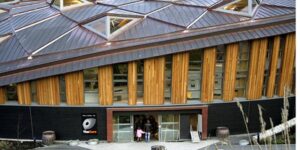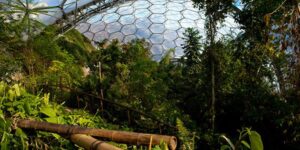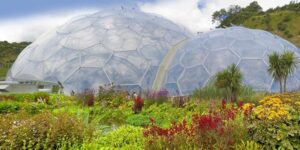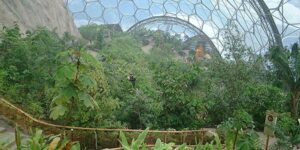
A visit to Cornwall is surely not complete until it is paired with a day spent at the magnificent Eden Project. Whether you’re a gardener, a nature-lover or a family, this wonderful attraction is bound to capture your imagination.
What is the Eden Project?
Put simply, the Eden Project is a huge global garden housed in a series of breathtaking tropical biomes. It’s one of the UK’s most popular attractions, and for good reason.
The first designs of the famous Project Biomes were discussed right back in 1996 thanks to Tim Smit, the brains behind the idea, who had previously been a part of the team working to restore the Lost Gardens of Heligan (also in Cornwall). The architects settled on giant bubbles as the ideal shape for the project. This was to accommodate the lay of the land; bubbles are able to settle on any shaped surface – even irregular clay pits, which is what the project was due to be constructed on.
The aim was to create a space that housed plants from all over the world. There is a Rainforest Biome and a Mediterranean Biome, each enclosure emulating the individual ecoclimates necessary to support the various species. There is a Canopy Walkway to get a better look at the plants, a section dedicated to South Africa’s unique Fynbos habitat and a waterfall crashing through the South American rainforest. The gardens outside encourage a ‘grow your own’ approach in the allotment section, there is a ‘plants for fuel’ area, a sculpture created entirely from recycled products, a ‘Wild Cornwall’ habitat, kids area and a sense-garden, as well as much much more!
 One of the project’s key incentives was to focus on the relationship between plants and people. They are an educational charity and wanted to encourage an interest in the social and environmental projects accessible to everyone, creating an unforgettable learning experience for students. In fact, a more recent addition to the site is the large education centre called The Core which has all sorts of interactive displays for visitors to get hands-on.
One of the project’s key incentives was to focus on the relationship between plants and people. They are an educational charity and wanted to encourage an interest in the social and environmental projects accessible to everyone, creating an unforgettable learning experience for students. In fact, a more recent addition to the site is the large education centre called The Core which has all sorts of interactive displays for visitors to get hands-on.
 Being green is a large aspect of the project and much of the focus goes on the importance of recycling and making use of what the land can offer us. The project conducts valuable research into plants and conservation for this reason and hopes that its work demonstrates how plants give us food, fuel, medicine and materials as well as being part of a wider ecosystem that provides us with water and air. The Eden Project strives to prove to visitors that the natural world is essential to us as well as being beautiful, relaxing and inspiring. It makes for an incredible day out.
Being green is a large aspect of the project and much of the focus goes on the importance of recycling and making use of what the land can offer us. The project conducts valuable research into plants and conservation for this reason and hopes that its work demonstrates how plants give us food, fuel, medicine and materials as well as being part of a wider ecosystem that provides us with water and air. The Eden Project strives to prove to visitors that the natural world is essential to us as well as being beautiful, relaxing and inspiring. It makes for an incredible day out.
Where is the Eden Project in Cornwall?
The Eden Project is just 4 miles from the town of St Austell, on the south coast of Cornwall, and is easily accessible by car, train and bus. For those staying at Duloe Manor, the site is an easy 35 minute drive away.
By car: The recommended route is to take the A391 and follow the signposted route, although those travelling from Duloe Manor should follow the A390 and then turn down Prideaux Road. The postcode for the Eden Project is PL24 2SG
By train: The Eden Prohect is only a few miles from St Austell railway station, which is on the main line from London Paddington. The station then has a regular bus service to take visitors straight to Eden.
By bus: There’s a daily bus service which links the Eden Project with Newquay, Perranporth, Truro, Mevagissey, Lost Gardens of Heligan, Fowey, Looe, Polperro and Charlestown. For more information, click here.

Can you take dogs to the Eden Project?
Yes! Your four-legged friends are welcome to visit the Eden Project with you, although there are a few things to keep in mind:
- Dogs are allowed to visit the many outdoor paths in the Eden Project.
- However, dogs are unfortunately not permitted within the biomes – it is recommended you maybe visit in a group and take it in turns to enter the biomes, while others stay outside with your canine companion.
- Dogs must be kept on a lead and supervised at all times.
- Not allowed into play areas or buildings, other than the visitor centre.
- All dog mess to be picked up and disposed of in the allocated bins.
- Water and undercover dining areas for dogs are provided.
- Assistance dogs are welcome throughout the whole site.
Is parking free at the Eden Project?
There is plenty of free visitor parking, including electric vehicle charging points. From the car park, you can walk to the entrance or use the free ‘park and ride’ service.
10 facts about the Eden Project
When did the Eden Project open?
The Eden Project opened to the public on 17th March 2001.
Why was the Eden Project built?
There were many motivations behind the Eden Project – rejuvinating the southwest of England, was the original reason. In addition, it aims to provide a brilliant tourist attraction, fun family day out and opportunities for learning and education.
Who designed the Eden Project?
The Eden Project was designed by Nicolas Grimshaw of Grimshaw Architects.
How much did the Eden Project cost to build?
The Eden Project cost around £141 million to build, although it is estimated to also have generated over a billion pounds in spending since then!
What is the Eden Project famous for?
The Eden Project is probably best known for its iconic biodomes, which house a stunning collection of rainforest and Mediterranean plants.
How long does it take to go around the Eden Project?
On average, it takes between 2 and 3 hours to visit the Eden Project. However, tickets are valid up until the site closes, so there’s no rush!
How hot is it inside the Eden Project?
Even on a chilly Cornish morning, the Eden Project can be warm! As you’d expect, the tropical biodome in particular can reach temperatures of up to 35°C! It’s therefore recommended you dress in layers that can be easily added and removed.
Can you stay at the Eden Project?
There is accomodation on site, provided by YHA Eden Project. There is also on-site camping available.
What is the Eden Project inspired by?
The inspiration for Eden’s famous domes came from the geodisk system of American atchitect Buckminster Fuller, who created the spectacular Montreal Biosphere. Grimshaw Architects has also used a similar idea at Waterloo International Station.
Can you take food to the Eden Project?
There’s a selection of picnic areas outside the biomes, so feel free to bring your own food to enjoy in some beautiful surroundings. If you’d rather purchase something, there’s also a selection of restaurants and cafes serving gluten- and dairy-free, vegetarian and vegan options.

If you’d like to start planning your visit, take a look at the website to see up-coming events, check ticket prices and opening times: www.edenproject.com/visit
To learn how to stay at the charming properties of Duloe Manor, just over half an hour from the famous Eden project, simply follow the link below.

